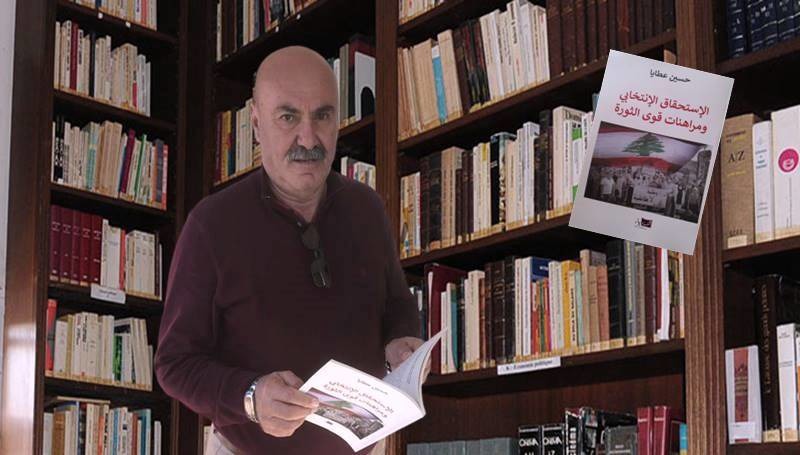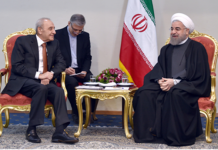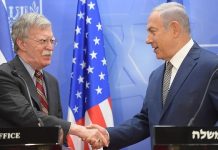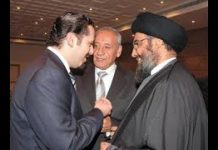Shiites Are No One’s Property
Hussein Ataya/Transparency Website/January 15/2025
(Free Translation from Arabic by: Elias Bejjani)
الشيعة ليسوا ملكية لأحد
حسين عطايا/موقع ترانسبيرنسي/15 كانون الثاني/2025
لم يكن يوماً ابناء الطائفة الشيعية ملكاً لزعيم او لحزب ، ولم يكونوا يوماً مذهبيين او طائفيين منعزلين عن لبنانيتهم وعروبتهم . دوما كان ابناء الطائفة الشيعية منفتحين على بقية ابناء الوطن وكانوا شيعة عرب حتى اواخر السبعينات من القرن الماضي.
فابناء الطائفة الشيعية من اكثر اللبنانيين انفتاحاً على الافكار اليسارية والعروبة وكل حضارات العالم بحكم ان اكثرية منهم مغتربين ومنتشرين في اصقاع العالم وجهاته الاربعة ومنهم المثقفين في كل الاتجاهات وطاقات علمية وفي كل انواع العلوم والحياة، إلى ان اتت عصابة الهمينة واستلمت الحكم في طهران في اواخر السبعينات واختصرت الحكم بملاليها وعماماتها التي تمتلك فلسفة ولاية الفقية وهي غريبة عن الشيعة العرب بقدر غربتها عن الدين الاسلامي نتيجة البدع والافكار والتقاليد الغريبة التي تتملكها، وبالفعل ما بين الشيعة العرب والشيعة الفارسية الصفوية فروقات شاسعة دينياً ومذهبياً، وهذا ما جعل ربيبتها حزب الله في لبنان يستورد الافكار الصفوية وبعض التقاليد التي لاتشبه شيعة لبنان العرب بدءاً من الشادور وتوابعه الى ماهو غريب عن مناسبات الشيعة العرب واللهجة العربية التي يتحدثون بها ولكن بلكنة فارسية غريبة عن تاريخنا وواقعنا اللبناني العربي.
لذلك على العهد الجديد ان يتعاطى مع الشيعة اللبناني كأحرار وليسوا كتوابع للثنائي وخصوصا لكتلة حزب الله الذي يختلفون عن شيعة لبنان نهجاً وتقاليد وسيرة. فالذي عاناه شيعة لبنان خلال الاربعين عاماً الماضية لم تعانيه اية من طوائف لبنان من قمع واضطهاد وتخوين بدأت في اواخر الثمانينات مع حرب اقليم التفاح مروراً بالاستيلاء على المقاومة بعد عمليات الاغتيال الكبرى بحق مناضلي جبهة المقاومة الوطنية “جمول” وغيرها حتى اصبحت المقاومة حصرية باتباع حزب الله الذي يدورون في فلك طهران وهم وكأنهم جسمٌ عريب في المناطق الشيعية.
لذلك على العهد تغيير الذهنية التي حكمت العهود الماضية والنظر للشيعة اللبنانيين كطائفة تختزن كفاءات وطاقات لبنانية بعيدة كل البعد عن ثنائية غريبة احتكرت تمثيل الطائفة الشيعية وبالقوة والترهيب وبعض انواع الترغيب فرضت نفسها كممثل حصري لابناء الطائفة الشيعية ، وذلك مثباٌ بتصرفات الثنائي في فترات الانتخاب من عمليات تخوين بحق كل من يختلف معهم في الفكر والرأي السياسي وعمليات الاعتداء على المرشحين كثيرة وكثيرة جداً وبعضها موثق بالصوت والصورة وارشيف وسائل الاعلام والصحافة محلياً وعربياً ودولياً يمكنكم العودة اليه في اي وقت وخصوصاً في الانتخابات الاخيرة في العام ٢٠٢٢ وماكتب عنها من كتبٍ ومقالات عدا عن شراء الذمم بالاموال والتقديمات.
فهذا العهد فرصة لكي يُعيد لابناء الطائفة الشيعية حربتهم وكراماتهم التي استباحها الثنائي خلال الاعوام والعهود الماضية. فالشيعة لم يكونوا يوماً ملكية خاصة مطوبة لاحد طرفي الثنائي فهم قدموا الكثير على مذبح الوطن ويستحقون التقدير والاحترام ورفع الظلم الذي لحق بهم. وبما ان العهد الجديد اتى بشخصيات جديدة من خارج منظومة الفساد والمافيات التي تحكمت بلبنان وكل اوجه حياته فالمطلوب اليوم من رئيس الجمهورية والرئيس المكلف استعادة حقوق ابناء الطائفة الشيعية من مغصبيها ومساعدتهم في التحرر عبر نشر اجهزة الدولة في المناطق الجنوبية والضاحية والبقاع لوقف الممارسات والاعمال التي يقوم بها اتباع الثنائي واللذين حولوها الى مزارع لا تشبه بقية المناطق اللبنانية من خلال الممارسات والاعمال الخارجة عن القانون والحياة العامة.
Shiites Are No One’s Property
Hussein Ataya/Transparency Website/January 15/2025
(Free Translation from Arabic by: Elias Bejjani)
The Shiite community has never belonged to a leader or a party, nor has it ever been sectarian or isolated from its Lebanese identity and Arab heritage. Historically, the Shiite community remained deeply connected to Lebanon and Arabism, maintaining openness to all segments of the nation until the late 1970s.
Shiites were among the most open Lebanese groups to leftist ideas, Arabism, and global civilizations. This openness stemmed from their widespread diaspora across the world, contributing to intellectual and scientific progress in various fields. However, this dynamic changed with the rise of the oppressive regime in Tehran in the late 1970s. The Iranian regime, dominated by mullahs and turbans promoting the alien ideology of Wilayat al-Faqih, introduced a doctrine foreign to Arab Shiites and Islamic values. Its heresies, peculiar ideas, and traditions stood in stark contrast to the faith and culture of Arab Shiites.
Hezbollah, as Tehran’s creation, imported these Safavid doctrines into Lebanon, enforcing alien practices on the Lebanese Shiites. This included the imposition of the chador and unfamiliar rituals, along with linguistic influences carrying Persian accents, all detached from Lebanon’s Arab history and identity.
The new ruling tenture must approach Lebanese Shiites as free citizens, not as mere followers of Hezbollah or the Amal Movement. Hezbollah’s bloc, in particular, diverges significantly from the authentic Lebanese Shiite values, traditions, and identity.
For the past forty years, the Shiites of Lebanon have suffered unparalleled repression, persecution, and defamation. This began in the late 1980s with “the Ekliem Al Tufah” region battles and the hostile takeover of the resistance following major assassinations targeting militants of the National Resistance Front (Jamoul) and others. Hezbollah monopolized the resistance, aligning it with Tehran’s interests, turning the Shiite areas into mere extensions of foreign ambitions rather than genuine Lebanese spaces.
The new leadership in Lebanon must abandon the outdated mindset of previous tentures and acknowledge the Lebanese Shiite community as a powerhouse of national talent and competence. The stranglehold imposed by the Hezbollah-Amal duo on the Shiite representation was enforced through intimidation, violence, and manipulation. Elections have repeatedly revealed this reality, with instances of treason accusations, violence against dissenters, and bribery, all documented in Lebanese and international media, including the 2022 elections.
This is a pivotal moment to restore dignity and justice to the Shiite community, long abused and suppressed by the Shiites duo’s (Amal & Hezbollah) practices. Lebanese Shiites have never been private property for any party. They have made immense sacrifices for Lebanon and deserve respect, appreciation, and justice.
Since the current leadership has introduced figures from outside the corrupt, mafia-like system that once controlled Lebanon, it is imperative for the President of the Republic and the Prime Minister-designate to prioritize the restoration of Shiite rights. This requires liberating the community from its oppressors through the deployment of state institutions in the South, Dahieh, and Bekaa. Only by dismantling the Amal-Hezbollah duo’s unlawful influence can the Shiite community once again thrive in dignity, free from oppression and exploitation.






















